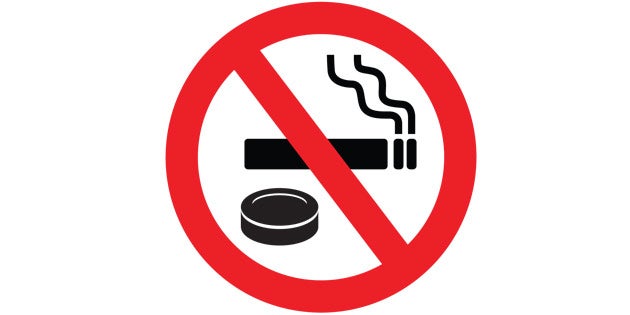A big change took place at the College of Charleston over the summer of 2014 – the College went tobacco free. The new policy governing tobacco use covers all areas of campus (including satellite locations such as Grice Marine Lab and the North Campus) and all forms of tobacco (including chew and e-cigarettes), and is rooted in the need to provide students with a healthy environment for learning.
“I was thrilled when the Board of Trustees decided to have the College become a tobacco-free university,” said Olivia Thompson, a public health professor at the College. “Tobacco use remains the leading cause of preventable disease and death in the U.S., and so many studies underscore the importance for students to be in a safe and healthy learning environment. It’s really not surprising that tobacco-free initiatives are springing up in higher education all around the country.”
EXPLORE: See the College’s new Tobacco-Free Policy and Tobacco-Cessation Resources.
According to Thompson, as of January 1, 2015, there were 1,514 smoke-free campuses in the U.S., and 1,015 of those were fully tobacco-free.
 “We know that tobacco-use diminishes your lifespan, but it also makes you susceptible to catching colds, the flu and other sicknesses, it produces second- and third-hand smoke that is harmful to other people and pets,” Thompson said. “Cigarette butts are extremely damaging to the environment and the habit is really expensive. Someone who smokes a pack a day burns through about $31.50 per week. That’s over $1,600 a year.”
“We know that tobacco-use diminishes your lifespan, but it also makes you susceptible to catching colds, the flu and other sicknesses, it produces second- and third-hand smoke that is harmful to other people and pets,” Thompson said. “Cigarette butts are extremely damaging to the environment and the habit is really expensive. Someone who smokes a pack a day burns through about $31.50 per week. That’s over $1,600 a year.”
Randy Risher ’16, a theatre major, was one of those pack-a-day smokers. As a non-traditional student, he’d been smoking at that rate for 25 years when the College’s new policy took effect. “I was actually pleased to hear about it,” said Risher. “I’d been thinking about quitting for years, but never managed to act on those thoughts.”
Through a campus-wide email, Risher learned about a tobacco-cessation program that the College

Randy Risher, a College of Charleston student who quit smoking with the help of an on-campus program.
was offering to students and employees – the American Lung Association’s Freedom From Smoking program. “I’m really grateful for the program. I don’t think I’d be a non-smoker right now without it. It really jump-started my efforts, and it convinced me to commit to 30 days of being tobacco-free. Getting over that hump was crucial.”
Risher explained that this is a two-month program where participants meet once a week. “For me, it was really the only way to quit. It works because you’re with a group, so you’re accountable to other people. You pick a quit date in front of them, and you each make a commitment. When you make an agreement with someone else in that way, it really reinforces the agreement that you make with yourself. And to do this with others who have the same discomfort and fears is really helpful.”
He says he did utilize prescription medicine to help with the process, and it was tough, but Risher has now been tobacco-free for 10 months. “For me, it’s huge. I’m an actor, and I played an incredibly demanding role in a show in November here on campus, where I had to sing and dance very actively. I wouldn’t have been able to do that at that caliber if I had continued to smoke. I really would have been dying on stage.”
So what advice does he offer for students who want to consider quitting? “Find others who, like you, don’t want to smoke anymore. It’s not easy to do this alone, so do it together.”





